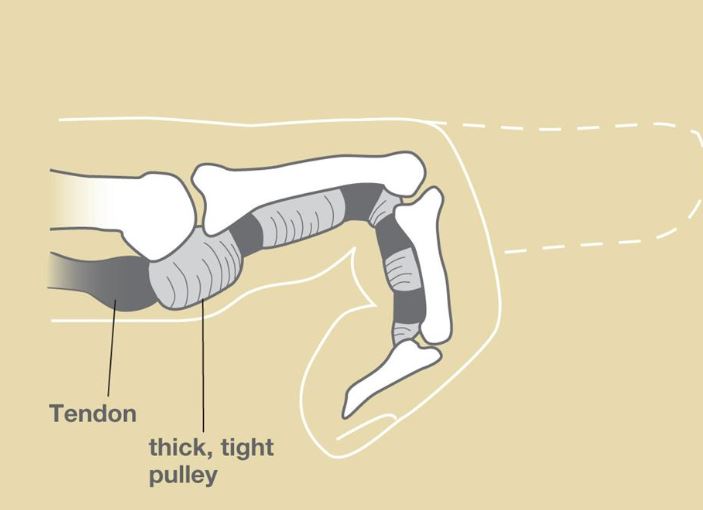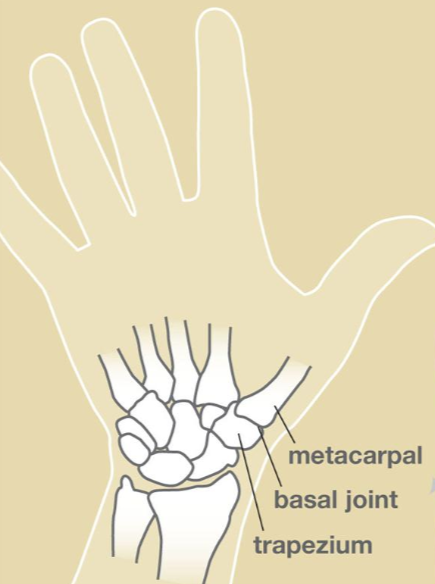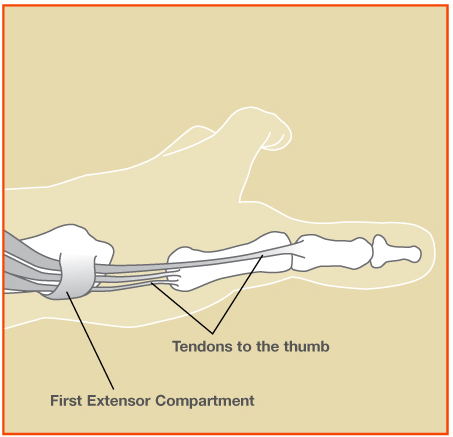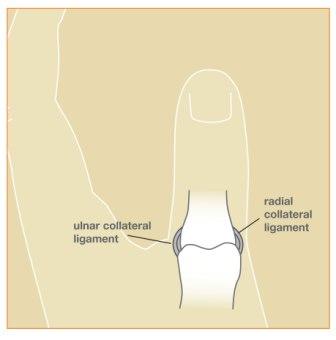The thumb is responsible for about 50% of all hand function. When the thumb is painful or injured, it becomes very difficult to use the hand. During normal life, we take our thumbs for granted. When the thumb is not working properly, we realize how important it is. There are several causes of thumb pain including: (1) trigger thumb, (2) arthritis, (3) wrist tendonitis, (4) carpal tunnel syndrome, and (5) skier’s thumb. Read below to learn more.
Trigger thumb

The tendon that bends or flexes the thumb is called the flexor pollicis longus (FPL). If there is swelling or inflammation around the thumb tendon, it will not glide smoothly. Sometimes the tendon gets stuck in the thumb pulley, causing the thumb joint to click, catch, or lock. This is called a trigger thumb. The thumb can be swollen, stiff, and very painful. Treatment includes rest, anti-inflammatory medications, splinting, and steroid injections. Most patients improve without surgery, but if symptoms persist, trigger thumb release surgery is very effective and has low risks.
Thumb arthritis
The human thumb is unique. We can touch the tip to the thumb to the small finger — a function called opposition. Most animals do not have an “opposable” thumb. This gives us the ability to write, use a needle and thread, and use hand tools. The joint at the base of the thumb which allows opposition is called the carpometacarpal joint (CMC). Normal, every day activities can cause wear and tear in the thumb CMC joint. When the joint wears out, it can become inflamed and painful. This process is called osteoarthritis or degenerative joint disease.

Treatment of osteoarthritis is aimed at reducing inflammation. Everyone gets osteoarthritis if they live long enough. So far, doctors have not found a way to prevent osteoarthritis. Wear and tear is part of the normal aging process. However, the symptoms of osteoarthritis can be treated by reducing inflammation in the joint. Ways to reduce inflammation and treat thumb CMC osteoarthritis include topical anti-inflammatory gels, oral medications, adjusting hand activities, using a thumb splint, nutritional supplements, and steroid injections. Turmeric nutritional supplements have gained popularity for use in reducing inflammation in osteoarthritis. These supplements can be purchased over the counter. Most patients improve without surgery. If symptoms persist, thumb CMC surgery can greatly improve quality of life and reduce pain.
DeQuervain’s tendonitis

The tendons that lift the thumb up are prone to tendonitis in the wrist. These tendons travel through a tight compartment on the thumb side of the wrist. If there is friction on the tendons, they can become inflamed and very painful. This is classic in young mothers, and is sometimes called mommy’s thumb. Treatment of DeQuervain’s includes thumb/wrist splinting, anti-inflammatory medications, hand therapy, and steroid injections. DeQuervain’s release surgery is sometimes necessary to resolve this condition.
Carpal tunnel syndrome
Carpal tunnel syndrome is a type of pinched nerve. When this nerve is pinched, it causes numbness and tingling in the thumb, index, middle, and/or ring fingers. Some patients feel electric shock sensations or burning pain in their thumbs. Treatment for most patients include wearing a wrist brace at night, stretching exercises, hand therapy, and steroid injections. Carpal tunnel surgery is very effective for most patients if non-operative treatment is not successful or if nerve compression is severe.
Skier’s thumb
Trauma to the thumb is common. During a fall, most people land on an outstretched hand to brace themselves. Unfortunately the ligaments in the thumb can become injured in this way. The ulnar collateral ligament (UCL) of the thumb is vulnerable to tearing as the thumb is bent backwards and to the side. If this ligament does not heal properly, patients can have pain and weakness with pinch tasks. For most minor sprains of the thumb, temporary immobilization in a splint or cast is successful to allow healing. If the ulnar collateral ligament is fully torn, however, surgery is usually recommended to fix the injury. Hand therapy is usually helpful during the recovery process.

If you have an injury to your hand or thumb, or pain which does not go away with conservative treatment, make an appointment with a hand specialist to get an accurate diagnosis and good treatment plan. If you live in the Raleigh, North Carolina area, Dr. Erickson and his team at Raleigh Hand to Shoulder Center are here to help.
